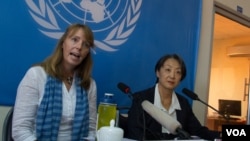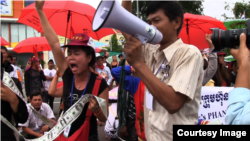The United Nations special rapporteur on human rights in Cambodia, Rhona Smith, began a 10-day mission to the country Monday.
Civil society representatives who met with Smith at the outset of her investigation say human rights groups raised concerns over freedom of expression, Internet freedoms, pressure on civil society and the fairness of elections in coming years.
Chak Sopheap, executive director of the Cambodian Center for Human Rights, told VOA Khmer that the groups spoke of legislation to regulate nongovernmental organizations and elections, which they say will make it more difficult for civil society to operate in the country.
"What civil society has raised to her is related to the fundamental rights and democracy in Cambodia, which are under threat," Sopheap said. "As we know, the NGO Law and the Election Law are threatening NGOs, who are working closely on these political activities."
Sopheap also said NGOs will have to play an important role with commune elections in 2017 and in 2018 national elections, which are expected to be hard fought, and whose duration is likely to mean a heightened risk of unrest.
Nay Vong Da, a human rights monitor at the Phnom Penh-based Adhoc, who also met Smith on Monday, told VOA Khmer that pressure on local human rights groups has increased. Adhoc seminars on rights education, for example, had been stopped in the past few months.
Nay Vong Da, however, added, "We are happy because we have informed [Smith] about all aspects of the rights issues and the restriction of our civil society organizations.
"She listened and took notes carefully and promised to bring all these issues to discuss with the government to change, improve or to properly implement international standards."
Rights of women, indigenous
Smith's 10-day mission marks her second official visit to Cambodia since being appointed to the U.N. Human Rights Council in 2015.
The U.N.'s Office of the High Commissioner for Human Rights says Smith, a professor of international human rights law at Britain's Northumbria University, will focus on women’s rights and indigenous rights on her trip. A statement said she will take a close look at Cambodian civil society's concerns over recent developments regarding human rights in the country.
The U.N. human rights office in Bangkok released a statement last Thursday, condemning the conviction of Cambodian Facebook user Kong Raya, who was charged with incitement after posting about a "color revolution" in the country.
Adhoc's Da told VOA Khmer that Raya's case, and other recent cases involving Internet freedom, were brought to the envoy's attention.
"We also raised issues related to the online threats and imprisoning [people for] online expression, including Kong Raya's case, [opposition senator] Hong Sok Hour's case, and other related cases," Da said. "We have told [Smith] to raise the issue with the government's leaders to understand these rights, which are stated in the constitutional law."
Government response
The head of the government's Human Rights Committee, Mak Sambath, dismissed the concerns raised by civil society, saying the government was implementing laws and working toward the rule of law.
"To have human rights respected, we need to obey the law, which is not creating chaotic activities like we wish," Sambath said. "For instance, the freedom of expression on social media, Facebook, the government allows us to use it. We can do constructive criticism of the government, not inciting and insulting the leaders. It is not freedom of expression.
"If you look at countries in Southeast Asia, related to freedom of speech, which country is better than Cambodia? There is none," he added.
Sambath said he was scheduled to meet the U.N. envoy Friday, when he will discuss human rights reports on Cambodia and the establishment of a national institute on the issue.
Smith is also scheduled to meet with key government officials, lawmakers, rights monitors and political parties during her mission.
Produced in collaboration with VOA's Khmer Service.













